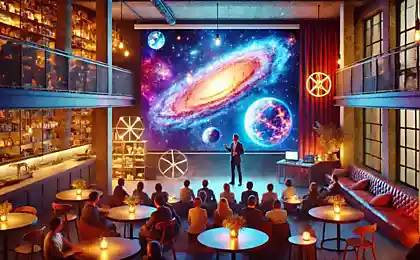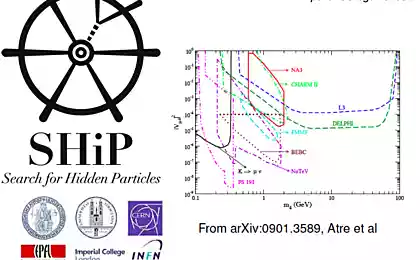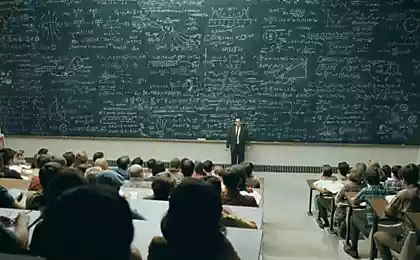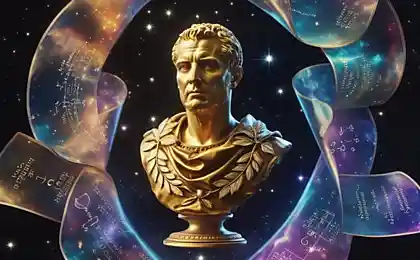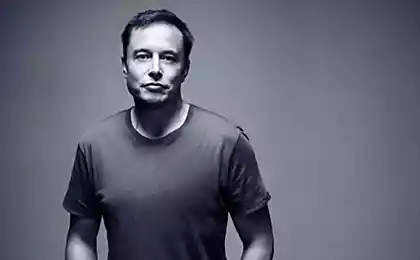1540
Reflections on new fundamental breakthroughs after Peter Thiel's Stanford lecture
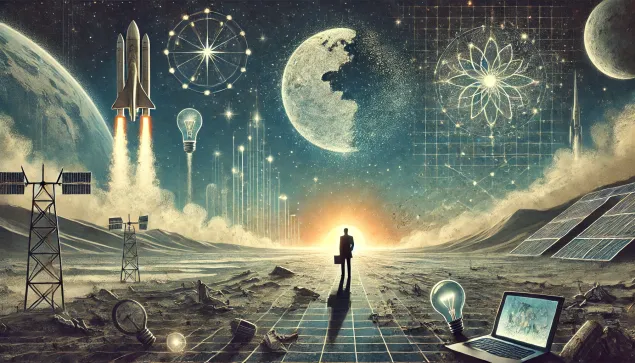
- Reading Peter Thiel speaks of the dominant pessimism — ... I found it most important in his message — America is entering a phase of pessimistic uncertainty (other countries do not make sense — they do not form an agenda) — no one knows what will happen or how, but there is a vague sense that the deterioration will increase — on different layers it will manifest itself in different ways.
- Apparently, this is because all the important breakthroughs at the level of technology have taken place – those that significantly improved the external quality of life, but did not approach the transformation of a person as a person. Although we have surrounded ourselves with wonderful things, we have changed little internally, and the changes that seem to have occurred in more or less prosperous countries are superficial. We have remained essentially primitive, egocentric socially dependent beings, for most of whom all meanings are reduced to the desire for a stable feeder, with large ones, with less ambitions.
- Technology has allowed us to live warmer, move faster, dress more, communicate more easily, eat conditionally better, but for the most part, we have not become more meaningful. Scientists make a lot of discoveries, but this is by inertia. There is no demand for science at all. As the late Clarke said, “We had the opportunity to go into space, but we prefer to throw birds at pigs.” Of course I am generalizing, and I am not saying this out of condemnation. I think about all of this in the context of what Thiel said: no projects. He talked a lot about the fact that venture capitalists are becoming more pragmatic, but the real reason is not because there are no projects that excite the imagination. Innovators have been flooded by Lean Startup, which is about reducing the risks, but not about disruptive innovation. We have accumulated too much knowledge and become very sophisticated, but this is negative knowledge - we can say - which is uninteresting, but not able to say what is interesting, and what is interesting from the point of view of investors - looks like a dull shit for geeks, and even geeks, there seems to be no real ... .
- The lack of meaning... Lack of courage and despair...
- No one wants to become a bouzum scientist and repeat Tesla’s asceticism. But everyone wants to play with their toys and go to Bentley and live in Rodeo Drav. Science ceased to be an end in itself and became a career technology for obtaining lifelong tenure. The path of knowledge is lost and replaced by the guides from the series “How to achieve success in five steps?”, forgetting that there are no known steps on the path of knowledge.
- All modern scientific fantasies were formed in the thirties, developed in the 60s and now live not in universities, but in blockbusters from Marvel or from the DC comic. If you look at heroic blockbusters, you can see how monotonous this set of super-innovations is. These are dreams not even of the past, but of the century before last - instantaneous movement, the ability to see through walls, the ability to read thoughts, the ability to endure loads, not to get sick, not to feel pain, to have superpower - all these are the aspirations of a weak man thousands of years ago and even three thousand years ago, all this is nothing more than the content of myths and fairy tales of primitive society, archaic archetypes of ideas. But all this is external, all this does not affect the existential meanings of the human being and does not give a global answer to the question - why?
- Can you instantly transport anything, anywhere? Why? You will not transport people from poor countries to richer ones because they are not needed there. You will not move troops to poorer countries because poor countries are ready to surrender to you. Rather, you need to think about how the poor get to the rich. You don’t have to see through walls because you won’t see anything new. You don't need to know people's thoughts because they're empty. You do not have to invent a perfect counter-terrorism, achieve immortality, rid people of disease, and solve many problems of antiquity because these problems are the essence of modern economics.
- Finding a breakthrough solution, you put hundreds of millions of people out of work, you destroy entire industries. If you can instantly transfer knowledge to a person in 5 seconds through a wonderful gadget, then the entire modern education system immediately dies. You don’t need a person to be powered by solar energy, because all agribusiness dies immediately (sorry, we need to feed the pets), we don’t need antigravity and teleportation, because the entire transport infrastructure becomes meaningless. We do not need the ability not to feel cold and hot, because the whole construction industry immediately becomes unnecessary, and we replace admiration of architecture with admiration of nature. But such omnipotence is not necessary primarily because any superman is independent and does not need anything. It cannot be controlled, therefore, the main principle of power on our planet is lost - the creation of an artificial scarcity of access to resources and the dominant value system based on one principle - acquisition. We live in a world of corrosion and entropy, so the only way to resist it is to accumulate, acquire and create faster than destruction and decay.
- In light of this, I think progress is slowing down because people have become more or less aware of its meaninglessness in the direction it is heading now. People realize that their lives do not change at some internal level. Yes, they began to live longer, but the amount of creation per unit of time is rapidly decreasing, the problems have become more, they have simply become different. But the main thing is that people have lost their sacred meanings and have completely moved away from the main question – about the meaning of their being. Moreover, asking such a question has become marginal. Science as an existential value paradigm and the technology that follows from it changed the environment, shifting the vector from the internal to the external, solved some problems and, naturally, gave rise to new ones. Philosophy died without finding a solution.
- But in general, the impasse is growing, because the question is why is rising more and more. The only answer to this question is in geopolitics, the last resort. But this approach leaves only military technology alive. The general theme here is that we should have scientific and technological leadership only because otherwise other countries will quickly gain it and take over. While forgetting that people and politicians who have such imperial ambitions simply do not exist on earth, they are in the past totalitarian regimes that developed at the expense of the paranoid ambitions of their leaders.
- Now it is impossible to declare any nation an enemy, because despite political borders, migration and the Internet have long erased the boundaries of psychological and ethno-confessional. Therefore, the topic of technological leadership is not true. Everyone is scared of China, but what does that mean? China has become dominant, its people have become richer, domestic consumption has increased, the quality of life has increased, and what? How does this negatively affect other countries? Militarily? Delusion? A dozen nuclear missiles reduce any military and economic advantages to zero, this was realized in the 60s of the last century. But even if that happens, what paradigm will China replicate? The answer is clear – the modern US. – Peter Thiel Nothing new again. We have to understand that more high-speed railways, more roads, cars not on gasoline, but on electricity or even on biofuels, do not change anything. Several thousand years ago, there were no heavy trucks, but pyramids were built, and now there are, but more fundamental objects were not built. Nothing really changed.
- What good is the development of modern medicine if it is not available to more than 95% of people? And the obstacles are not technological, but exclusively political and commercial.
- Communism is not an option either, abundance does not lead to the need to work, but only to degradation. The experience of wellfer and TV shows proved this, and the relentless efforts of the USSR were constantly stimulated by the “war threat” and propaganda – slaves always need a whip, no matter what form it is, in the form of a whip, fear, a credit collar.
- The situation with innovation in modern times is like communicating with an old man. You offer him all sorts of new gadgets, fenny, but he does not need anything, because all his friends are already in the grave, it is impossible to return youth and all this does not matter to him.
- Everything failed, Thiel writes – space, energy technologies, biomed, transport projects. He says they failed because of the economy, but they didn't. They had no essential meaning in advance. They didn’t change people’s lives, they didn’t give new horizons, they just reproduce old patterns. Do you want to go to space and conquer a new planet? Well, what are you going to do there? Earth with all its problems?
- Religions, too, went bankrupt because they had driven the noumenal (according to Jung) to their periphery, and long ago became corporations with their share of influence and market. A solid God for solid people. Religion as an institution has failed to offer innovation to the human spirit.
- Politics has lost its ability to generate challenges because elites have flooded ignorance and a focus on risk. In short-term courses began to teach Charisma. In fact, we're bankrupt and we've come to realize that what we think of as innovation doesn't really change our lives. We’ve made it easier to connect with each other over the internet, but it hasn’t added more meaning to our communication. We have become faster and more comfortable to drive, but this has not changed the essence of the problems we solve. Scientists promise us immortality, but ignore the question of the meaning of existence. The whole innovative and scientific party seems to conspire and say: guys leave us alone, we create innovation. We're looking for a cure for cancer, but we're trying to ignore the idea that cancer might be a consequence of our insanity and frustration. We create antidepressants, which is considered honorable, but we pretend that talking about the causes of these depressions is not a comilfo. With discussions about innovation, we try to cover up the dramatic meaninglessness of our lives. The idea of scientific progress and technological improvement while ignoring spiritual ignorance has run its course, and the last to see it will be financiers and investors, as the dumbest.
- So what's the breakthrough? What areas can really be considered breakthrough? I think that what is happening now is what happened in the Middle Ages, when science was born as a new paradigm against the background of religion, and apparently now science has become a kind of religious dogma. And a real breakthrough can not be in any technological direction, because if you imagine a world full of inventions of which we dreamed, and thanks to science fiction it is easy, you will notice that this world resembles a dull shit because there are no new or old sacred meanings in it.
- Imagine that you have super power, super gaze, can walk through walls, not die, not get sick, fly, consume solar energy, change the physical world with your mind. Imagine that you are as omnipotent as primitive man could have imagined. Imagine that you are like the superheroes of the comic book. Imagine? What are you gonna do? Why live? Who needs you? How have your meanings changed? No, not even so – who needs your superpowers? You're going to replace 1 million Chinese to dig a hole, you're going to work instead of x-rays. You will catch dangerous terrorists who are invented in secret laboratories. Will you work as a vehicle engine? Where will you apply your abilities? Will you defend the country? What? From who? From aliens? Will you live forever? Well, how will you entertain yourself? Watch TV shows? Helping people? Like the gods, there is no problem. You urgently need someone small, weak and insignificant to make your innovation necessary. I’m 100% sure you can’t think of anything, even those who try to think about it. This is a semantic, existential dead end.
- What's the point in the quality of life and all the power of technology, if the life of a primitive savage and a packed modern hipster is equally meaningless and ignorant.
- Since the middle of the century before last, science as a paradigm has been advancing, and hastened to draw a line between what it considered acceptable and what was inconvenient. Science is not a meta-paradigm, but another religion, as evidenced by Kuhn’s proof that representatives of old scientific paradigms could not find the strength to accept the facts of new paradigms. Nothing could convince them. We have not changed the paradigm for a long time, probably for more than 100 years, and the one that we lived has exhausted itself, and the forerunners of the new in the works of science fiction and attempts to comprehend ancient philosophies and spiritual practices.
- We have come to a line that separates us as human beings, as what we have come to call human from something else that is open to new meanings and pictures of the world. I think it is at this point that we are going to have really fundamental breakthroughs in terms of changing our identity. And this transformation is not just a reduction in cognitive function.
- Most likely, this will be due to the ability to perceive the implicit connections of the universe, find new contexts and connections, have a different personality architecture and other algorithms for producing a picture of the world, about which the pioneers of transpersonal psychology wrote 20 and 30 years ago. A really fundamental breakthrough awaits us in the ability to see differently and, accordingly, to volition differently, to direct will. We are asleep, and until we wake up, there will be no more breakthroughs, even if outwardly we thrive.
- Perhaps it will be somehow connected with the ideas of transhumanism, but most likely it will be a different vector, implying not a different level of psycho-physics, but other horizons of meaning, morality, collective consciousness. It is a kind of transformation of a rational man into a wise and collective man, for reason and wisdom are not equal, and a rational man now resembles a strange cyborg controlled by external stimuli. The late Erickson said that all people are in an unconscious trance more than 90% of the time, as Timothy Leary wrote, people who were perceived as marginal compared to the official establishment.



